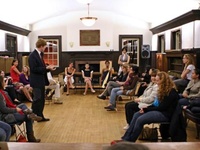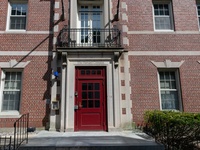{shortcode-3890b863ad3f7ce88b4b776322a91f0521666bb7}
In 1873, The Crimson published its first newspaper. One hundred and fifty years later, as alumni flock back in town for this weekend’s 150th Anniversary Celebration, we’ve asked members of the Editorial Board to reflect on the bits of magic that have brought — and continue to bring — 14 Plympton St. to life.
What piece published in The Crimson is particularly meaningful to you, and why?
I often think about the first staff editorial published in The Magenta — the publication that later became The Crimson — because it reminds me of how far we’ve come. The Crimson today is an incredibly different place than when it was first founded; it is now a space teeming with so much diversity and life. This ancient and all-knowing building is home to an entire world — one where I’ve met my closest friends, where so many students come together to produce a daily paper. This institution is built on generations of commitment and vigor.
—Shanivi Srikonda ’24, a Crimson Editorial Editor, is a Human Developmental and Regenerative Biology concentrator in Quincy House
{shortcode-52f1c4d91151a21c7f9fda9bdb71c5fe18b7c048}
“A Welcome Addition”: In 1960, we applauded the introduction of the Social Studies concentration at the college. Today, most staff editorial meetings could double as a Social Studies tutorial with the number of concentrators on the board. It’s comforting to see our intertwined history with that concentration, especially as the precedent seems to hold up — except perhaps our suggestion that Social Studies “should remain a small field.”
—Saul I.M. Arnow ’26, a Crimson Editorial Editor, lives in Holworthy Hall
“After King,” a piece published four days after Martin Luther King Jr.’s 1968 assassination, holds great importance to me.
“King was always a militant,” the author points out; as such, it was hypocritical for officials to ask for nonviolence after riots broke out in urban areas. The author also correctly identifies the disconnect between the people’s calls for equality and the “empty response” from the government. The piece demands substantial, effective legislation, as well as a complete restructuring of our racial system, to bring about meaningful change. It is disheartening that King’s vision is still unmet in present-day America.
—Clyve Lawrence ’25, a Crimson Editorial editor, is a Government concentrator in Adams House
When Antony J. Blinken ’84 was nominated as Secretary of State, I curiously read through all his opinion pieces in The Crimson, amused that the United States’ top diplomat’s undergraduate thoughts were captured and preserved for my perusal. It also reminded me of the frightening reality that anything we write today will be available in perpetuity for the judgment of future readers.
—Jacob M. Miller ’25, an Associate Editorial Editor, is a Mathematics concentrator in Lowell House
I first came across Noah D. Oppenheim ’00’s “Keep the Old Sheet Flying” while frantically researching The Crimson’s history ahead of General Elections, when we elect new members to the newspaper. For a piece that marks the end of something, it’s rather hopeful. Four years of student journalism taught Oppenheim the thrill of chasing a lead and the necessity of stepping back. Somewhere in between, he found equal value in the two, and a home at the Editorial Board. My own Grand Elections have since passed, but I keep returning to Oppenheim’s words for their poignancy. I have a good feeling that sometime soon, I’ll start to live them.
—Violet T. M. Barron ’26, a Crimson Editorial Editor, lives in Straus Hall
{shortcode-14060e83ebb54d938c2752a398710c522bb80850}
In 2007, The Crimson released its most clever precedent (as far as I’m aware), “God Bless America.” It illustrates the rhetorical power humor can have and reminds us not to take ourselves too seriously all the time. It also reminds me — because I keep forgetting — that “Harvard is overrun with communists, hippies, sexual deviants, and Jeffersonian liberals.”
—Lucas T. Gazianis ’24, an Associate Editorial Editor, is a Social Studies concentrator in Currier House
“Let Them Eat Code” remains the most based staff editorial this board has ever published. We’re never overturning you, baby.
(Some argue that we may have overturned without explicitly stating it in the follow-up “Let Them Eat Camus.” To that, I respond, “We Can Have Our Code and Eat Camus, Too” — and also, we aren’t The Crimson’s Editorial Board without a yearly shifting of guards that leaves us in a well-meaning but utterly lost tizzy of precedents.)
—Christina M. Xiao ’24, a Crimson Editorial Chair, is a joint concentrator in Computer Science and Government in Eliot House
I read the Editorial Board’s 2020 Commencement staff-ed almost two years after its publication, and I was struck by its enduring power. The piece viscerally encapsulates, through a series of poignant vignettes, the event that so abruptly yet totally took over my, and all of our, transitions into adulthood — the Covid-19 pandemic. It’s a perfect utilization of the editorial snippets style, and a powerful reminder of journalism’s ability to connect us in the most isolating of moments.
—Ian D. Svetkey ’25, an Associate Editorial Editor, is an Integrative Biology concentrator in Eliot House
{shortcode-cf61b33ac8eb84e2925f5fdddbb7248f1a63f30f}
“Are We In The Minority?” puts into words the feelings and thoughts that I have long been unable to articulate. In my short time as a student here, it felt like I was having an identity crisis with what to call myself, and I struggled to relate to a lot of my Black peers. This piece not only helps me understand who I am but also provides perspective as to how to navigate Harvard as a Generational African American.
—Zion J. Dixon ’26, a Crimson Editorial Editor, lives in Wigglesworth Hall
“Five Generations of Renty” in many ways is a generational piece — both literally and metaphorically. Two years after its publication, the Lanier family is still awaiting justice for their ancestors.
As I approach my graduation year, I reflect on the cultural property that was stolen from the Lanier family and the memory of Renty and Delia. I reflect on the generational legacy that I will leave behind. I hope that when I throw my graduation cap to the clouds in May 2024, Harvard will have let go of their anti-Black desire to win Lanier v. Harvard — setting the stage for real change.
—Ebony M. Smith ’24, a Crimson Editorial editor, is a joint concentrator in Government and African & African American Studies in Eliot House
Saturday, Oct. 1, 2022. After days of procrastination, I had to submit an opinion piece before the midnight deadline. With little inspiration, I chose to write about what seemed the most accessible topic to me: my country, and by extension, continent. Seven months later, as I walk to Social Studies 98VC: “Colonialism and Postcolonialism,” as I toy with the idea of pursuing a masters in African Studies, I am reminded where it all started: The Harvard Crimson.
—Joshua Ochieng ’24, an Associate Editorial Editor, is an Economics concentrator in Quincy House
Having line-edited and fact-checked more than 250 individual Opinion pieces to date, I’ve become well-acquainted with the predictable physics of the process: Apply enough force to a piece (with suggestion-mode comments, handcrafted fact checks, and boxed wine consumption proportional to its mass) and a once-inert Google Doc will move through the pipeline to a place of publication.
But even as proofing has come to feel Newtonian in nature, I still find myself surprised by what comes after. For every painstakingly prepared piece, there is an equal and opposite reaction: the provision of a Ramadan prayer break, the inauguration of an APIDA affinity graduation, the offering of a long-suppressed language. The Third Law of Editorial Publication, and the op-eds that help to illustrate its presence, keep me in perpetual awe of even the most mundane physics of this paper.
—Eleanor V. Wikstrom ’24, a Crimson Editorial Chair, is a Social Studies concentrator in Adams House
{shortcode-6ca487c0c7b45528230ec7db89aec9d4f9b2af47}
Who from The Crimson’s history do you want to offer some words to?
To Gay W. Seidman ’78, Imtiyaz H. Delawala ’03, Peter F. Zhu ’11, Steven S. Lee ’16, and Kristine E. Guillaume ’20: There is a special pride in being the 150th President of The Harvard Crimson and knowing that I — a woman with Korean heritage — am not the first. Not the first woman, not the first person of color on record, not the first Korean, not the first woman of East Asian descent to lead 14 Plympton St. Thank you for all the late nights and early mornings you poured into this newspaper to make historic firsts. May The Crimson have many more.
—Cara J. Chang ’24, the President of The Crimson’s 150th Guard, is a History concentrator in Leverett House
On a brisk night in fall of 2021, I found myself once again in the Sanctum of 14 Plympton St. Only this time, we were saying goodbye to HMK and CAS. Somewhere between the cake slices with lit candles and everyone else’s chatter in the background, I felt at peace again. It’s strange — my favorite memory being my very first goodbyes, but I’m immensely grateful for having people I didn’t want to say goodbye to. Dear HMK and CAS, if you still read The Crimson: Thank you, and (Ed)love you, always.
—Ruby J.J. Huang ’24, an Editorial Comp Director, is a History concentrator in Leverett House
Guillermo S. Hava ’23-’24, your piece, “Why I Smoke,” was the first I read as I prepared to join the Editorial Board. I was amazed by your brilliant wordsmithing and never-ending wit, but also by how honest and direct you were in your self-reflection. At that point, you were an enigma to me, the oh-so-powerful Editorial Chair — I wouldn’t have considered that in the coming months, you’d become a great friend. Thank you, Guille, for your friendship, for inspiring me to write what’s in my heart, and for always being loud about what you believe in.
—Matthew E. Nekritz ’25, a Crimson Editorial editor, is a Social Studies concentrator in Cabot House
To Raquel Coronell Uribe ’22-’23, the President of the 149th Guard:
For many, many people, within Harvard and without, you represent a remarkable first. I would like to offer a few further firsts you represent, to me: the first person that busy and that important to listen — really listen — to me in earnest and with kindness; the first person crazy enough to listen to my ideas and say “so do it”; the first leader I’d met who made me fundamentally reconceptualize what leadership looks like; the first person who made me understand what it truly meant to sacrifice for an organization.
The first person who comes to mind when I’m asked what makes The Crimson special.
Raquel, we miss you, and we can’t wait to welcome you back to campus. No words — neither snippet nor novel — can quite capture what you’ve done for 14 Plympton, and for us.
—Tommy Barone ’25, an Editorial Comp Director, is a Social Studies concentrator in Currier House
{shortcode-d77d47bba8647f9f842218df2276df3015e267ba}
What is your favorite memory from your time at The Crimson so far?
’Twas past midnight before the deadline for comp op-ed number two, this past fall, and I was up staring at an empty Google Doc, knowing I had procrastinated just a bit too long. It took me nearly two hours that night to compose my thoughts in a way that felt genuine, and though I was frustrated with the process, I remember marveling at the blissfulness that moment brought. Furiously clacking away on my keyboard to complete silence outside the window, I rediscovered the magic of writing that I had first encountered as a young child. And three months later, that late-night product got picked up as my first published op-ed.
—Leah R. Baron ’25, a Crimson Editorial Editor, is a Statistics concentrator in Lowell House
I attended my first true Editorial Board meeting in December 2022, and though at the time it felt uncomfortable sitting in a room full of unfamiliar faces, it now stands out to me as one of my favorite memories from The Crimson. I can recall tiny sketched portraits of meeting attendees from CMX and emotional goodbyes to those who had served their final semester on the board, but also my growing sense of gratitude for this community I was now a part of.
—McKenna E. McKrell ’26, a Crimson Editorial Editor, lives in Pennypacker Hall
My favorite memory of The Crimson was when the Editorial Board reached an impasse after the majority pitch didn’t reach the two-thirds required to overturn precedent. The room erupted into chaos as votes were counted over and over, while a small group of us chuckled on the sidelines.
—Ivor K. Zimmerman ’23, a Crimson Editorial Editor, is a Classics concentrator in Kirkland House
The Crimson is characterized by its many late nights. This favorite memory of mine takes place in just one of those many moments. Having stayed up late editing a particularly frustrating piece, CMX, CJC, and I found ourselves, in the wee hours of the morning, squished in a corner of the sofa (as we refused to move the other items crowding the other corner), watching K-pop dance videos on repeat. It was a great moment of love after long hours of revisions — the perfect ending to a long night.
—Hea Pushpraj ’25, an Associate Editorial Editor, is a History concentrator in Adams House
A tour of The Crimson during early comp pulled me into 14 Plympton St. for the first time. An excited News Editor in a Harvard half-zip walked us along the halls, narrating the histories that lived within the dim lights and wooden floors. Stories of University Presidents and framed pages echoed through the building as I reflected on the significance of physical spaces and land. As a Latina, the decades-long fight for a Latine cultural center at Harvard pervaded my thoughts. I contemplated on how buildings and the mechanisms which exist within them can reinforce injustices or deconstruct them. I resolved for the latter.
—Shania D. Hurtado ’25, a Crimson Editorial Editor, is a Government concentrator in Currier House
I was running 10 minutes late to my very first comp meeting and was waiting outside of 14 Plympton St. in the cold, under a flurry of snow. I tried the front door, but it was locked, and I questioned whether I had come to the right building. Peering into the window, I caught the eye of someone inside. I watched them descend the stairs, red party cup in hand, with a compassionate smile on their face.
“Here for the Editorial comp?” they asked. I nodded eagerly, slipping inside into the warmth and scurrying towards the Sanctum.
—Lauren H. Kim ’25, a Crimson Editorial Editor, is a joint concentrator in Government and Psychology in Eliot House
{shortcode-81b964298f0827636db3fba59e021a0c0805c904}
After a Thursday meeting whose topic now evades me, under the warm glow of string lights, we all stood around the horrendously out-of-tune piano in the corner of the Sanctum. EHA tickled the broken ivories and — boxed wine in hand — everyone sang along. EVW harmonized, RJJH danced with HMK, and I knew then that this would be a place I’d call home.
—Sidnee N. Klein ’25, an Associate Editorial Editor, is a Sociology concentrator in Currier House
As a recently elected member of The Crimson’s Editorial Board, I’m thrilled by how many great memories I’ve already been able to make here. Above all, I’ve enjoyed my time engaging in banter with anyone else who’s been willing to entertain me during comp or in between staff-ed deliberations.
—Julia S. Dan ’26, a Crimson Editorial Editor, lives in Straus Hall
I cannot choose a single memory. I instead choose a place. The Editorial office — perpetually too small, continuously overflowing with boxed wine and a half-eaten box of Oreos, and always staffed with editors and writers tapping away on keyboards. It is home to the post-Crimson party debriefs, it is the awesome and aggravating twilight zone where time feels like a suggestion, and it is where I found my family. Memories are etched on the walls; it is the physical space we hand down to the next round of eager Editorial writers.
—Ellie H. Ashby ’24, a Crimson Editorial Editor, is a Social Studies concentrator in Adams House
Read more in Opinion
Read a Book! Write a Rhyme!















